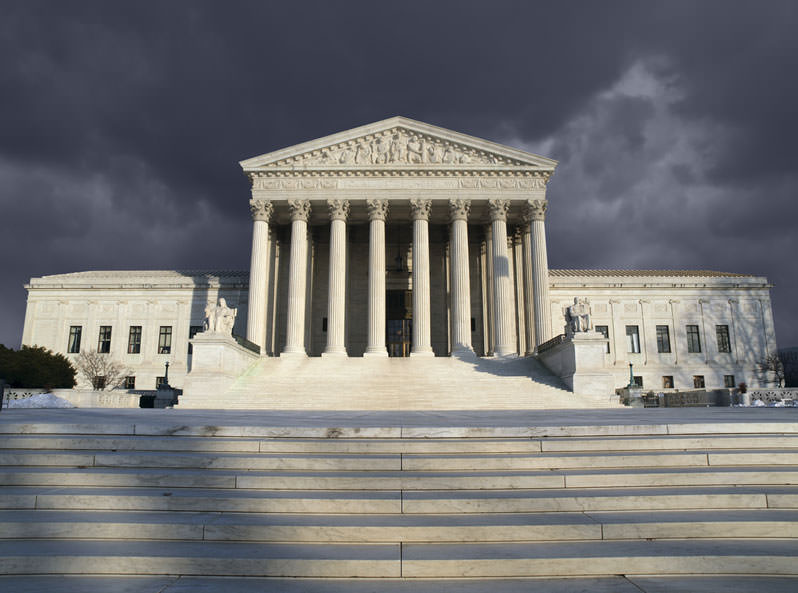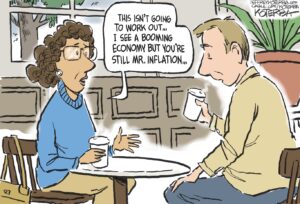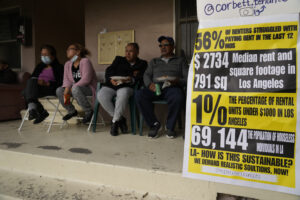Recess Is Over: What the Supreme Court Has in Store for Us Now
If you’ve been wondering what has happened to the Supreme Court and all those transformative decisions it was supposed to issue during its 2013-14 term, you’re not alone. Shutterstock
Shutterstock
If you’ve been wondering what has happened to the Supreme Court and all those transformative decisions it was supposed to issue during its 2013-14 term, you’re not alone.
Ever since four of the justices — Antonin Scalia, Samuel Alito, Clarence Thomas and Sonia Sotomayor — boycotted President Obama’s Jan. 28 State of the Union address, the high court has been on recess, and is not slated to reconvene until Feb. 21. The tribunal was also on break for nearly a month over the year-end holidays.
So what’s going on? Are Chief Justice John Roberts and his crew of black-robed colleagues competing with comedians Jon Stewart and Stephen Colbert to see who can set the record for most vacation time taken by a public figure, or is this just the calm before the much anticipated next jurisprudential tidal wave?
As the undecided cases on the current docket suggest, I’m opting for the latter interpretation, as no one — not even the most powerful federal appointees with lifetime tenure — can rival the late-night comics for extended time off the job.
And it’s not as though the justices have been idle during their current break, either. To the contrary, they’ve been out on the hustings, delivering speeches, staying in the news and — intentionally or not — casting the tremendously important work of the court in a darkly comedic light.
The increasingly zany Scalia was in Hawaii on Feb. 3 addressing law students at the state university about the evils of the court’s infamous 1944 Korematsu opinion, which upheld the World War II internment of Japanese-Americans. Scalia warned that such practices could occur again, although he refrained from speculating as to whether the potential victims of any renewed internments might be drawn from the political left or right, or might consist of his own favorite scapegoats — gay and lesbian Americans. Scalia also neglected to mention that the U.S. already has the world’s highest incarceration rate.
Also on Feb. 3, Alito spoke in West Palm Beach, Fla., at a joint meeting of the Forum Club and the local county bar association attended by more than 1,100 people. Among other remarks, Alito said that he and his fellow justices never worry about public opinion when handing down rulings. Although press reports have indicated that Alito’s speech was peppered with anecdotes and jokes, the accounts were silent as to whether that particular comment, delivered by a longtime stalwart of the Federalist Society, drew laughter or simply a collective nod of approval.
In the meantime, the chief justice spent the February recess appointing more judges to the secret FISA Court, while Sotomayor and Justice Elena Kagan gave heartfelt talks at Yale Law School and at the New York City Bar Association, respectively, about their personal journeys to the highest court in the land.
But of all the recess orations none could match the one coughed up by Thomas at Palm Beach Atlantic University for sheer hypocritical detachment from reality. Addressing a gathering of students, the Ivy League-educated jurist who benefited from affirmative action and is known for remaining silent during the court’s oral arguments, declared that race relations in the United States today are worse than they were during his boyhood in Georgia. And just for good measure, he added that throughout his life he has experienced “more grief from northern liberal elites” than he ever received from bigots in the segregated South.In a saner world, Thomas’ ravings might be consigned to a harmless segment of “The Daily Show.” But with the court’s recess drawing to a close, Thomas’ views have the potential to shape the outcome of a range of cases that will have a lasting impact on our laws, politics, the environment and the economy, including:
Affirmative Action: Schuette v. Coalition to Defend Affirmative Action (argued in October)
Last term, the court dealt a mild setback to colleges that have chosen to adopt race-conscious programs when it remanded a case involving the University of Texas’ admissions plan back to a federal appellate panel for reconsideration under a more stringent and difficult-to-meet constitutional test (Fisher v. Texas). This time, in a case from Michigan that offers Thomas the opportunity to deny others the benefits he once received, the question before the court is far more extensive: whether a state, by a legislative act or popular initiative, can prohibit affirmative action even if a university system chooses on its own to implement or maintain a race-based program.
Environment: Environmental Protection Agency v. EME Homer City Generation (argued in December)
At the request of the Obama administration, the American Lung Association and environmental groups, the court has taken up a federal appellate ruling that had invalidated the Environmental Protection Agency’s Cross-State Air Pollution rule, which is designed to enforce the Clean Air Act by setting limits on nitrogen oxide and sulfur dioxide emissions from coal-fired power plants in 28 Eastern states. Although some observers see the decision to hear the case as a sign of support for the EPA, don’t take any deep breaths. The Roberts court has a dismal record on environmental protection, aligning itself time and again on the side of corporate interests and polluters.
Unions: Harris v. Quinn (argued in January)
To put it bluntly, the Roberts court hates unions, especially public sector unions that contribute financially to Democratic Party candidates and progressive political causes. In 2012, in SEIU v. Knox, the court made it harder for public unions to collect “fair share” fees from nonunion members of established bargaining units to combat anti-union ballot initiatives. Now, the court will decide if collecting any fair share fees, including those for non-electoral purposes, from nonunion workers to promote collective bargaining violates the First Amendment associational rights of those workers. Another union defeat could spell the end for labor’s already dwindling influence on the nation’s political life.
Separation of Powers: NLRB v. Canning (argued in January)
Next to unions, the five-member Republican majority on the current court dislikes Obama. The Canning case involves the president’s temporary “recess” appointment of three candidates to the Republican-dominated National Labor Relations Board in January 2012, while the Senate was holding pro forma sessions every three days but was for practical purposes closed for business. Although the appointees were subsequently confirmed by the full Senate, the case is widely regarded as a test of presidential authority.
In another era, reining in executive power might be seen as a much-needed affirmation of shared authority among the three branches of government. Given today’s dysfunction in Washington, a loss for Obama may mean even more tea-party obstruction.
The Death Penalty: Hall v. Florida (to be argued in March)
In 2002, the court held that executing the mentally disabled violated the Eighth Amendment prohibition against cruel and unusual punishment. However, the court left it up to the states to define disability.
Florida is one of 10 states (the others are Arkansas, Delaware, Idaho, Kentucky, Maryland, North Carolina, Tennessee, Virginia and Washington) that use IQ scores of 70 as a bright line establishing disability. Freddie Lee Hall, convicted of murder and himself a victim of horrendous abuse as a child, has tested at or below the cutoff on several occasions. His co-defendant received a life sentence, proving once again the arbitrary nature of the death penalty.Campaign Finance: McCutcheon v. Federal Election Commission (argued in October)
Dubbed by some commentators as Citizens United 2.0, this mean-spirited piece of litigation was generated by the Republican National Committee and Alabama businessman Shaun McCutcheon. Together, they seek to overturn current federal law limiting the aggregate amount of money any single person can contribute directly to candidates for federal office, political parties and political committees to $123,000 in any two-year election cycle.
A victory for McCutcheon and the RNC, coupled with further curbs on the ability of unions to raise and spend money on elections, will only enhance the stranglehold of the oligarchy on the nation’s politics.
Corporate Personhood and Obamacare’s Contraception Mandate: Sebelius v. Hobby Lobby Stores, Inc. (to be argued in March)
In a set of consolidated cases, the court will decide whether for-profit corporations possess a First Amendment or statutory right based on freedom of religion to deprive their employees of health insurance coverage for contraception, as mandated by the Affordable Care Act. In order to rule in favor of the companies, the court once again would have to step through the looking glass on the road to full corporate personhood.
Privacy: United States v. Wurie (to be argued in April)
In a case only recently accepted for review, the court may signal how it will ultimately rule on the controversy surrounding the NSA’s telephone metadata surveillance. At issue is the authority of police, acting without a warrant, to read the call records contained on the cellphones of people booked into jail.
How the court decides any of the pending cases, of course, is by no means certain. But if the court’s past performance is any kind of reliable guide, anyone except the most right-wing zealots among us may be left wishing by the end of the current term that Roberts and his cronies had stayed on vacation rather than returned to work.
Your support matters…Independent journalism is under threat and overshadowed by heavily funded mainstream media.
You can help level the playing field. Become a member.
Your tax-deductible contribution keeps us digging beneath the headlines to give you thought-provoking, investigative reporting and analysis that unearths what's really happening- without compromise.
Give today to support our courageous, independent journalists.









You need to be a supporter to comment.
There are currently no responses to this article.
Be the first to respond.